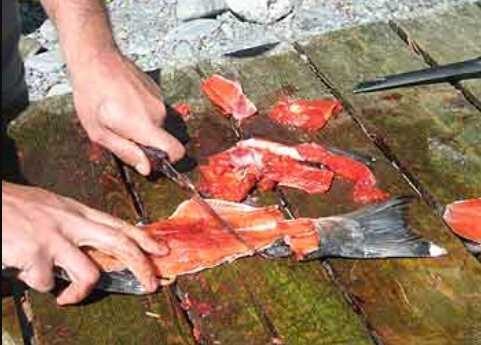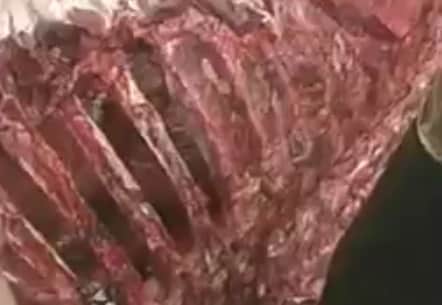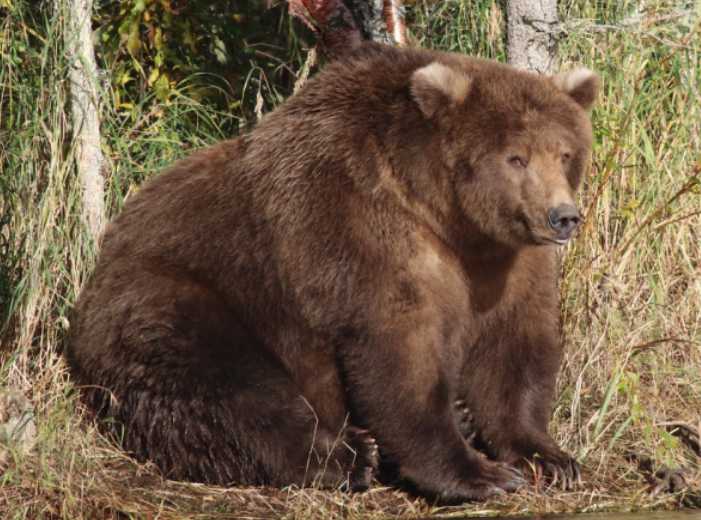
(Anchorage) — As salmon surge into Southcentral fisheries from Chitina to China Poot Bay, anglers and dipnetters are reminded to properly dispose of fish waste. Discarding fish waste on public or private property or along roads, pull-offs and trails can attract bears into areas frequented by the public and result in fines ranging from $300 to $1,000.
In Anchorage, where nearly 300,000 people live in close proximity to bears, fish waste is discarded each summer in vacant lots, greenbelts, and along local streams and lakeshores. Anchorage area wildlife biologist Dave Battle believes many people who dump fish waste don’t realize the danger they create for others.
“Fish attract bears,” said Battle, “and bears are likely to defend those food sources.”
Dumping fish in these places can also attract big fines. Prohibited under Alaska’s littering laws (AS 46.06.080), illegal dumping can lead to penalties of up to $1,000.
Illegally discarded fish waste has also created problems in Matanuska-Susitna Valley communities and on the Kenai Peninsula. Soldotna area wildlife biologist Jeff Selinger encounters it each summer and agrees that it sets the stage for bear conflicts. He offers an easy solution for anglers and dipnetters participating in area fisheries: “Toss your fish waste in the appropriate containers at the Soldotna (Central Peninsula) landfill,” Selinger said, “it’s free.”[xyz-ihs snippet=”adsense-body-ad”]
Fish waste should not be dumped into local lakes and streams as fish pathogens and parasites can be drainage specific. Moving fish waste from drainage to drainage has the potential to introduce fish pathogens into stream systems, thus endangering local salmonids, according to Dan Bosch, Anchorage regional management coordinator with the Division of Sport Fish.
“Dumping fish waste into any other stream is not a proper method of disposal,” said Bosch.
Anglers who clean fish on site are encouraged to chop carcasses into numerous pieces and throw them into fast-moving water. Anglers who remove fish from the fishing site and fillet or process them somewhere else should follow these recommendations to dispose of fish waste in a safe manner:
- If allowed, fish waste should be taken directly to a waste transfer station or to the landfill. Another option is to freeze fish waste to eliminate odors and then place it out with garbage on the morning of trash pickup. Do not place waste out the night before pickup.
- The Central Peninsula Landfill located at Mile 98.5 Sterling Highway 2.5 miles south of Soldotna accepts fish waste free of charge from 8 a.m. to 5:45 p.m. seven days a week.
- Fish waste can also be deposited at Peninsula transfer facilities, including those in Cooper Landing, Kasilof, and Ninilchik, but in smaller quantities; all fish waste must be double-bagged in plastic trash bags with a limit of two bags dropped off per day.
- Anchorage Regional Landfill, the city’s Central Transfer Station, and the Girdwood Transfer Station all accept residential, non-commercial fish waste.
- Matanuska-Susitna Borough Solid Waste takes residential, non-commercial fish waste at all facilities, but it must be bagged. The central landfill location serves Palmer/Wasilla, with transfer stations located in Big Lake, Butte, and Sutton.
Source: ADF&G
[xyz-ihs snippet=”Adversal-468×60″]






